Federal budget 2024: What it means for Bundaberg, Fraser Coast, Gympie, Burnett
The state has moved to shore up the future of the long-demanded repair of the Paradise Dam wall, which was left under a cloud following the handing down of the 2024 federal budget.
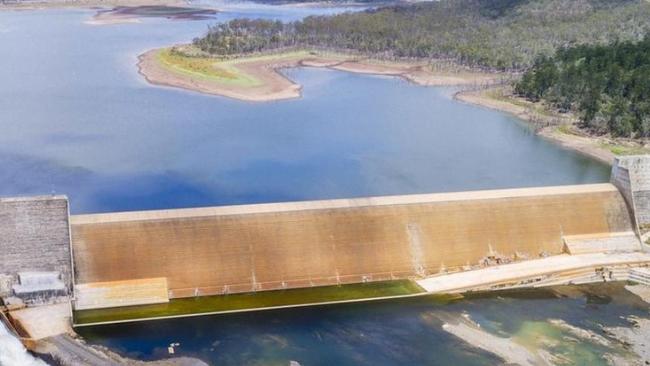
Bundaberg
Don't miss out on the headlines from Bundaberg. Followed categories will be added to My News.
A spokeswoman for state Water Minister Glenn Butcher’s office says plans for the Paradise Dam have not been squashed in the wake of 2024 federal budget papers saying money for the project has been “deferred” until the government sees the plans.
The spokeswoman said Wednesday morning the federal government had written to confirm its $600 million funding was still on the table, to be provided once the business case has been produced.
Budget papers released by the federal government Tuesday has thrown the future of the funding under a cloud saying “$592.3 million over five years from 2023–24 for the Paradise Dam Improvement project, the Big Rocks Weir project and the Hughenden Irrigation Scheme has been deferred, with an investment decision to be made upon completion of the business cases and planning works”.
The spokeswoman said the federal government’s budget included $50m for the dam’s business case, expected to be completed in late 2025.
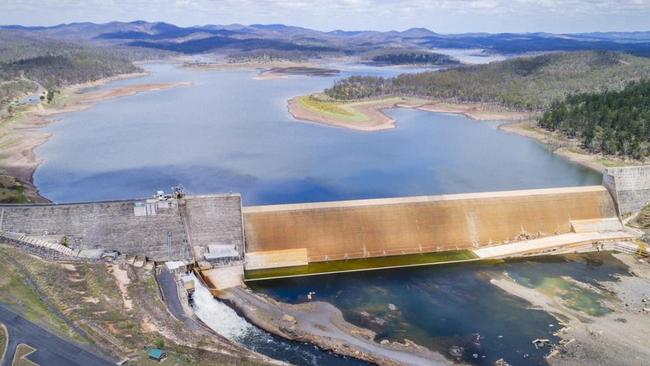
The budget’s claim of deferral was criticised by Hinkler LNP Keith Pitt and Flynn LNP MP Colin Boyce.
In a joint statement released shortly after the budget was handed down, the MPs said the deferral would have long-lasting impacts on Bundaberg’s agricultural sector.
“Paradise is well and truly lost,” Mr Pitt said.
“The Albanese government has failed the growers and producers who help feed the nation,” he said.
In a joint statement from Mr Butcher and Bundaberg MP Tom Smith, released Wednesday afternoon, the Labor members said the dam wall work was still moving ahead.
“As I’ve consistently said, we’re working through the process to get the Dam’s full water supply restored - while eliminating any doubt for safety and water security of Bundaberg,” Mr Smith said.
“Clearly Keith Pitt and Colin Boyce either don’t understand budgets or are playing politics with this important project.”
The condition of the dam near Bundaberg has been a lightning rod for the region’s farmers and community after the wall was initially lowered amid safety concerns.
Plans were underway to restore the wall to its original height, but those have run into turbulent waters in the past year.
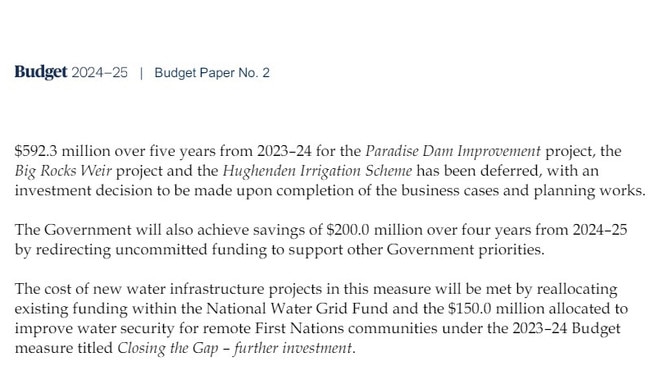
No new money was earmarked for the $14 billion Borumba Dam pumped hydro in the Mary Valley outside Gympie, which had an undisclosed amount injected in the 2023 budget.
Treasurer Jim Chalmers brought down his third budget on Tuesday night, announcing only the second surplus in the past 16 years amid uncertain economic times and an election on the horizon.
But there was little else in new funding for cities across the Wide Bay Burnett region, which failed to rate a mention during Dr Chalmers’ speech, which primarily focused on cost-of-living and housing relief.
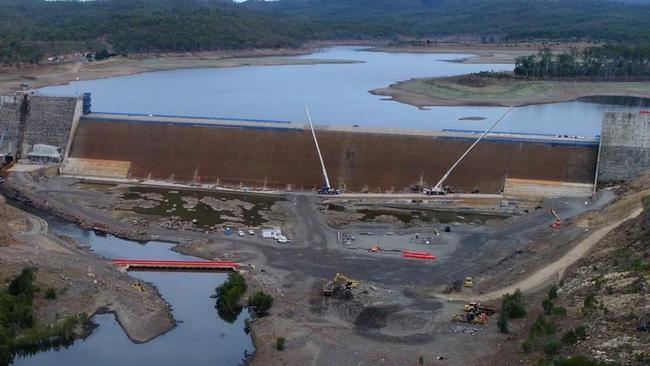
Dr Chalmers characterised it as a “budget for the here-and-now” and “a budget for the decades to come”.
“More homes means more affordable homes and a better deal for buyers, builders and renters alike,” he said.
“The current housing pipeline is backed up (so) we’ve already allocated $3.5 billion to address bottlenecks and slash red tape – and this budget includes another $1 billion to help states and territories build more housing sooner.
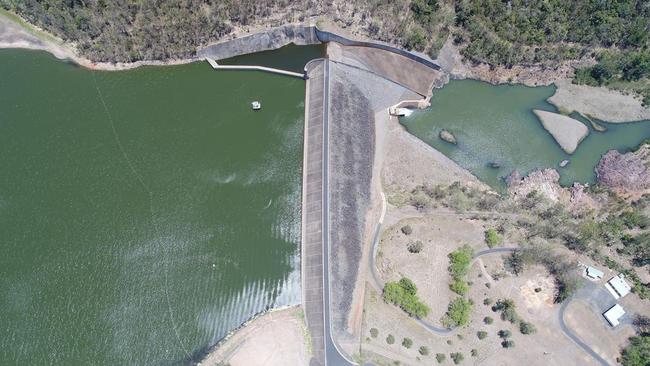
“We’re providing $89 million for 20,000 additional fee-free TAFE and VET places to train more construction workers to do the work we’ll need.”
However, Real Estate Institute of Australia Queensland spokesman Andrew Bell said the measures, while welcome, would do nothing to deal with the immediate housing crisis gripping the state.
“Some of these measures are good but there is too much blockage in the bureaucracy whereas we need policies which can get developments underway sooner than later,” he said.
“The level of certification for buildings are of such a high standard now that the average building is just not interested because it takes eight to ten months to qualify and that is too hard and many of those who work in regional areas (across the state) don’t think it’s worth it.
“It’s one thing to throw money at housing and development but if they never land it is of no benefit.”
Mr Bell said measures which would provide immediate benefit would be capital gains tax reform, the slashing of infrastructure charges and government incentives for developers to build affordable housing, along with time-frames to ensure their projects are delivered within five years.
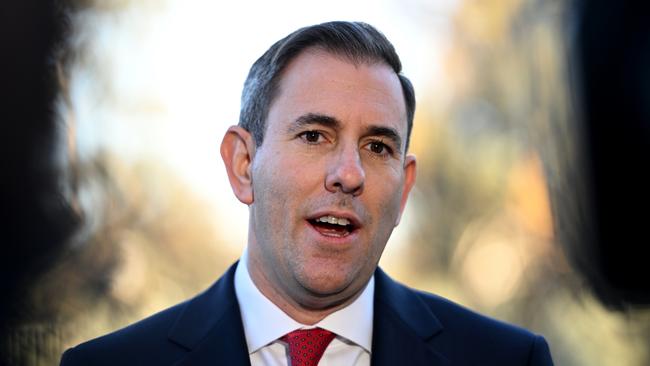
However, in a win for tens of thousands of small business operators across the state, Dr Chalmers announced a surprise continuation of the $20,000 instant asset write-off which was expected to end on June 30, a move which is expected to be welcomed by business groups across the state which had lobbied for the measure.
“We want Australian small businesses to share in the big opportunities ahead as well,” Dr Chalmers said.
“That’s why we are extending the $20,000 instant asset write-off until 30 June 2025, providing $290 million in cash flow support for up to four million small businesses.”
Dr Chalmers announced a $9.3bn budget surplus, despite previous years’ budget papers tipping a deficit.
However forward estimates forecast deficits to return across the next four years.
Dr Chalmers said the economic outlook was “framed in fraught and fragile global conditions”.
“The world economy is resilient in parts but subdued overall (and with) inflation lingering in North America, growth is slowing in China and tepid in Europe, tensions have escalated in the Middle East and persist in Ukraine, global supply chains are fragmenting,” he said.
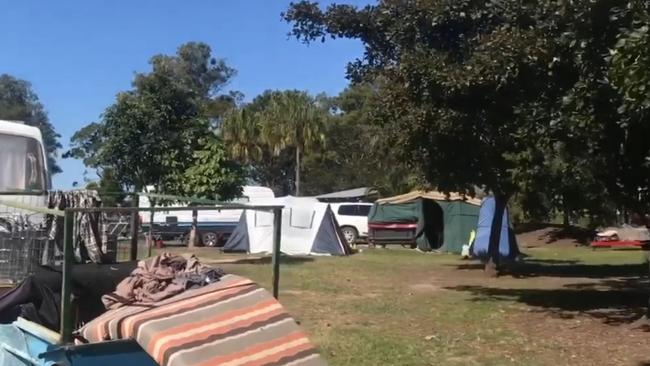
“This uncertainty combines with cost of living pressures and higher interest rates to slow our economy, with growth forecast to be just 1.75 per cent this financial year and 2 per cent next.
“Treasury is now forecasting inflation could return to target earlier, perhaps even by the end of this year (while) at the same time, around 780,000 jobs have been created under this government, a record for any first term.
“This is stronger jobs growth than in any major advanced economy, real wages are growing again for the first time in almost three years and business investment is now expected to record its longest annual expansion since the mining boom – and we’re addressing the pressures caused by population growth, with net overseas migration next year now expected to be half what it was last year.”
Gross debt will top $904bn this year before increasing past $1tn in 2025-26
Other key points of the budget include: $22.7bn across the next decade for the government’s Future Made in Australia manufacturing policy; The impact of the government’s revamped stage three tax cuts which will come into effect on July 1 and will see every tax payer receive some financial relief; A $300m energy rebate for power prices, with small businesses receiving a further rebate; $3 billion towards cheaper medicine; And he capping of indexation of student debt, wiping $3bn.


